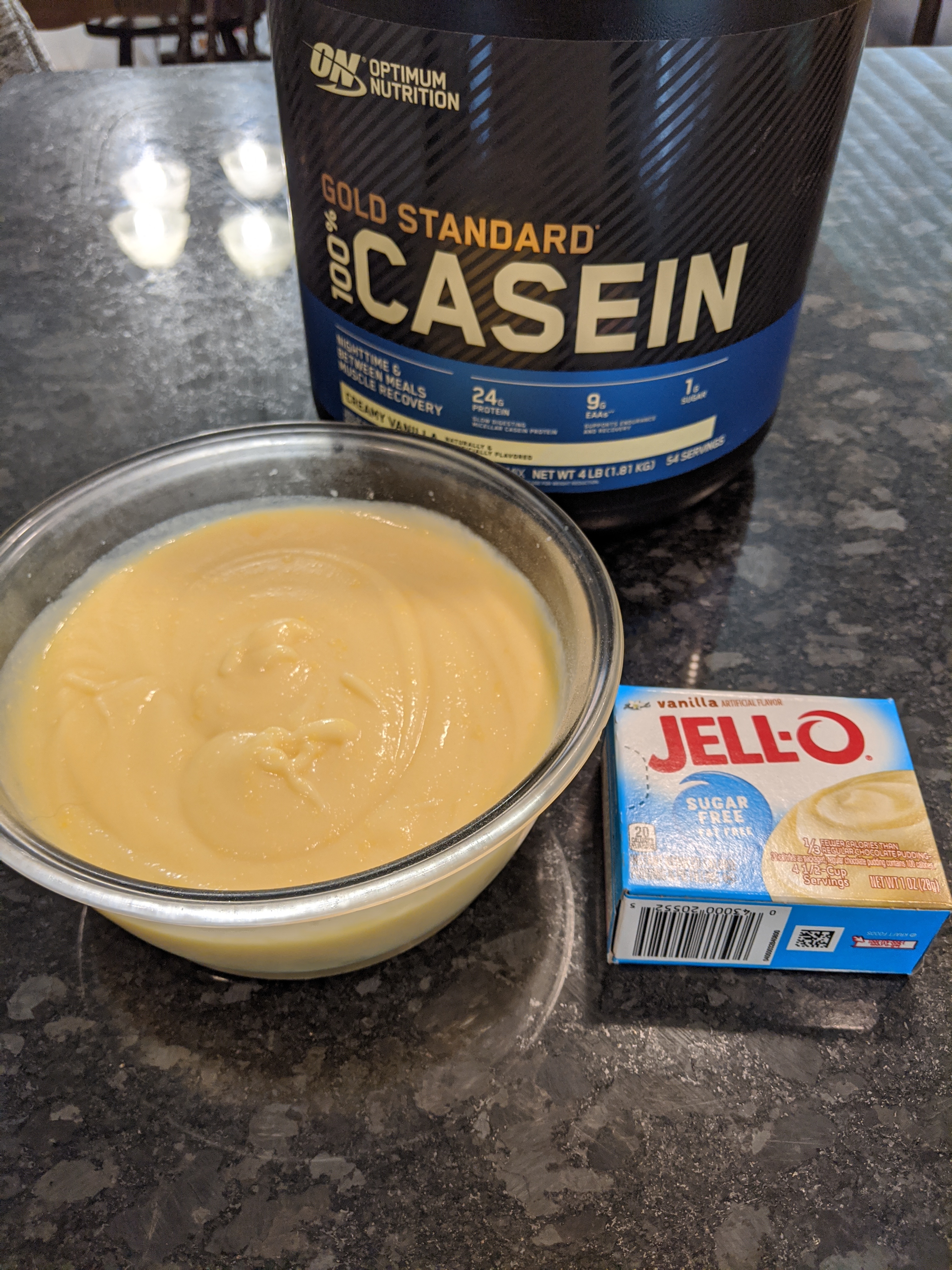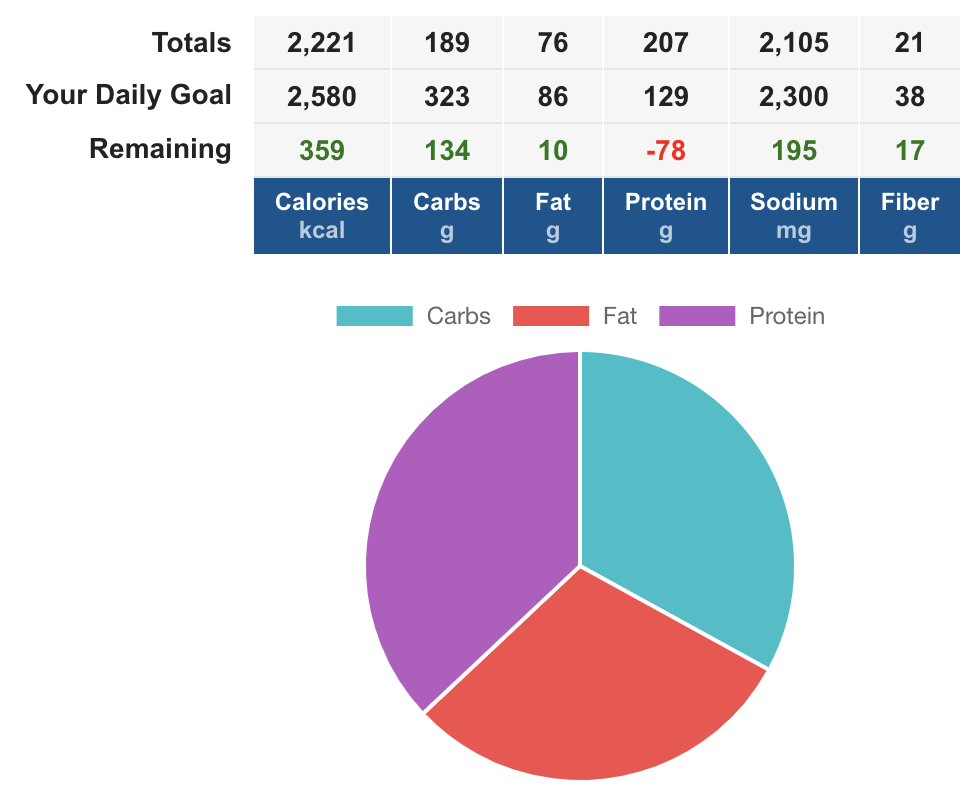Diet Guidelines I Follow
Posted on Sun 06 September 2020 in Fitness • 8 min read
Following A Diet
I love to eat and rarely feel full, so following a diet is very unintuitive to me. This has led to my bodyweight getting above 250 lbs multiple times in the past, while a more healthy bodyweight for my height of 6'2" is probably more like 200 lbs. On top of that, my type 1 diabetes and low testosterone means that my hormone levels are unbalanced, which affects weight and fat loss. When my blood sugar drops, my body naturally kicks in to an "eat everything" instinct, which doesn't help with weight loss.
There's all of my excuses (well, I could probably come up with more), but in spite of those excuses I have managed to lose weight fairly consistently multiple times. In between those times, I've also gained back the weight multiple times. The times where I have the best control of my health all involve the following main principles:
- Track everything I eat as accurately as possible (without stressing too much)
- Eat enough protein
- Eat enough fat
- Consistently work out and go for daily walks
- Don't drink a lot of alcohol
- Don't overcorrect for high or low blood sugar
- Eat more fruits and vegetables
- Cook at home as often as possible
- Have a plan for the whole day's food (even if it's flexible)
To clarify, I certainly don't think everyone would have to do all of those just to be healthy. Some people see that list and their first reaction is to wonder if I have an eating disorder or if my life is any fun. If that was your thought, let me assure you that I do not have an eating disorder and my life is a blast! I just find that if some or all of those items are left unchecked, my health is noticeably worse than if I can keep those things in line while still living the life I want to have.
Protein Goals And Sources
I have become a firm believer in the idea of more protein being better. Now, I'm sure you can have too much, and there are plenty of arguments on the internet about how you really don't need more than 100g/day and everyone is just overcompensating. That said, my best muscle growth has been while getting a consistent 200g/day, and I notice that I am far less hungry when I have a lot of protein with minimal total calories. It's also a lot harder to eat "junk food" when a huge portion of what you eat is protein, since most of what is considered "junk food" is fat and carbs.
Eating 200g of protein requires a pretty big change in your diet and food choices. I typically target 4 meals of 50g each to help spread out the protein throughout the day and give me a clearer short-term target for the meal. I attempt to get as many different sources of protein as I can to ensure complete amino profiles and prevent food boredom. This means I try to eat chicken, beef, turkey, fish, and nuts, while also using whey and casein powder or protein bars to get above 200. Here are some options I use frequently:
- Mix 1/3 scoop of chocolate or vanilla protein powder into coffee creamer to make a sweet coffee drink that you can sip on all morning. 3 of these makes an additional 30g or so of protein.
- Blend 2 scoops of protein powder into 2 cups of milk, then mix in a box of Jello sugar-free instant pudding mix. I like doing various powder flavors with the cheesecake pudding for best flavor combination. This is about 550 calories and 55g of protein for the whole thing, which is a great ratio.
- Cook ground meat (turkey, chicken, or beef) ahead of time with some basic seasoning like salt, pepper, onion, and garlic. Then, put 4-6oz cold meat in with 2-3 eggs or egg whites and a handful of spinach or mushrooms into a small pan in the morning for a relatively quick meat/egg/veggie scramble.
- Lunch while working from home is almost always leftovers from the night before, a vegetable, and a fruit. The leftovers are usually 1-2 servings of whatever meat we had, so I add in more protein if I need it. Since I'm working from home, I also tend to eat small pieces of lunch over the span of 2-3 hours to help keep hunger low and spread out the protein intake. The key for this is knowing the total amount I'm going to eat for lunch so I don't keep adding more food.
- Dinner is almost always 2 servings of a meat (which ends up being about 50ish protein alone), a side dish, and a vegetable. Sometimes the side is a second vegetable, which was a big hurdle mentally to get over but has really helped get more vegetables into my diet.
- I know there's been a lot of debate about how you don't really have to slam protein post-workout, but it's become such a habit for me to do a scoop of protein powder in milk after my workout that I just build it in to my diet. It also helps get some dairy as a protein source.

Here are some high-protein snacks I like to keep on hand to help in case I feel like I need to get something quick:
- Jack Links peppered beef jerky sticks (130 calories, 22g protein): https://smile.amazon.com/gp/product/B000GW46D4/
- Fairlife Core Power Elite High Protein Shake (230 calories, 42g protein): https://smile.amazon.com/gp/product/B01DDIRE2W/
- Chicken of the Sea Mackerel Fillet in Soybean Oil (120 calories, 19g protein): https://smile.amazon.com/gp/product/B00JSVKC1O/
- Quest Protein Chips (140 calories, 19g protein) - I like the Cheddar & Sour Cream the best, but most are pretty good https://www.questnutrition.com/collections/protein-chips/products/us-1-12-protein-chips-cheddar-sour-cream
- Quest Protein Bars (200ish calories, 20g protein) - My favorite flavors are White Chocolate Raspberry and Maple Waffle, but most are good and I like the variety packs https://www.questnutrition.com/collections/protein-bars/products/protein-bars-ultimate-variety-pack
Minimum Amount Of Dietary Fat
Since each gram of fat has 9 calories and each gram of protein and carbohydrate has 4 calories, it makes sense to maximize carbs and protein. However, since I'm very aware of my hormone imbalances, I try to keep my dietary fat at a consistent range of about 30%-40% of my bodyweight, which ends up being in the 70g-90g of fat range. I see lots of meal plans that include just chicken as the protein source, which means they have to supplement with fats like peanut butter or coconut oil. Since my plan involves a variety of meat sources, it doesn't really take much for me to hit 70g of fat between eggs, beef, coffee creamer, milk, and any oil used for cooking.
Cheat Day Vs. Carb Refeed
I have never planned to have a full cheat day or cheat meal, mostly because I cannot be trusted to just go hog wild. I think I could easily put down 5000 calories in a day if I was just allowed free reign, which would undo most of my work throughout the week. That said, I also don't skip on eating with friends or occasional drinking because I don't want my diet to dictate my life. The key for me seems to be only doing those occasionally, and not letting it derail my workouts.
I've noticed in the past that on some days where I eat more calories than usual, my weight actually drops a bit and I feel better. After reading about Skiploading and carb refeeding, I think I was unintentionally doing that and seeing similar results. Recently, I've been trying this as a concept but with a more detailed plan of eating 700 more calories on a single day of the week, with most of those calories being carbs. This means that if I'm eating 2300 calories on 6 days a week, I'll eat 3000 on Saturday and include things like pancakes or french toast, buns and bread on burgers or sandwiches, and extra fruit throughout the day. There seems to be a physical effect that is positive as well as a mental break that helps stay strict the other 6 days.
Thoughts On Intermittent Fasting
A few years ago, I tried intermittent fasting and lost a lot of weight doing it. In practice, it ended up being that I skipped breakfast, and made sure not to eat anything until noon, then try to finish eating by 8pm. The first couple weeks of skipping breakfast were painful, but I quickly adapted. I think the best thing about IF is the mental component of not allowing yourself to eat anything outside of certain time windows. Not eating anything is surprisingly easier than only eating a little bit. I think the root of this is that once you eat a little bit, eating a little more doesn't seem too bad, or getting a slightly bigger spoonful is really hard to notice. When you have a mentality of "I can't eat anything", it seems to be easier to not break that once you've practiced it.
Tracking Trends
I enjoy tracking life statistics about myself, like monthly mileage on our cars, net worth, bodyweight, and average blood sugars. This tracking has been a huge help for planning and keeping a diet, especially since I'm usually trying to stay under a certain amount of calories and over a certain amount of protein. Even knowing that you are tracking your food can have an impact on the decisions you make while eating throughout the day, as you realize that you have to enter it in your tracker if you eat it. This alone causes a better diet just through self-realization. which is very interesting.
I personally use MyFitnessPal, though I know others like Cronometer. I then take the MyFitnessPal stats about calories, carbs, fat, and protein to plug into a daily spreadsheet I have. This way, I can generate averages throughout a week or a month, and I can correlate it to my bodyweight trends to see how my calories and protein are affecting things. This has helped me see that any drastic changes to my calorie totals takes about 2 weeks before it shows up in my bodyweight.

Here are some tips I have for tracking food:
- Enter items as you're eating. I almost never remember everything I ate if I enter at the end of the day or the next day. By making it a routine part of your meal (which is admittedly easier said than done!), you'll have better data.
- Scan barcodes as often as possible. You still need to look at serving sizes and ensure accuracy of the scan, but it makes it so much easier than searching for foods.
- Weigh and measure as often as possible. I keep our food scale out on the counter and use it constantly. My main method is actually to put the package of food on the scale, and the take out food and use the negative number on the scale as the amount I'm eating.
- That being said, don't be afraid to guess! Tracking food can be stressful, especially if you're eating out or you didn't make the meal. Just give it your best guess and move on, as I've found for myself that worrying about the exact amount or item makes me more likely to stop tracking for a few days/weeks since I'm so worried about getting it exact. A best guess gets you 80% of the way there, and will certainly still help you see trends.